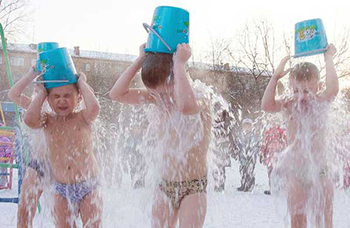(单词翻译:单击)

This shocking footage shows around a dozen tiny children running out into the snow wearing just their pants before they throw ice cold water all over themselves.
在一段让人震惊的视频中,大约十几名孩子只穿着短裤跑到雪地里,之后还往身上倒冰水。
The nursery children, aged between three and six, are taking part in a daily ritual which teachers and doctors claim will keep them healthy.
这些幼儿园的孩子们年龄在三岁到六岁之间,他们正在参加的“冰桶挑战”已经成为一项日常活动,而老师和医生们声称这能让他们保持健康。
A paediatrician checks the children are suitable, and permission from parents is needed as the ice showers are not compulsory.
由于“冰桶挑战”不强制孩子们参加,因此会有一名医生检查孩子们的身体是否适合,此外还要得到家长的允许。
But as the footage shows, most of the children taking part seem enthusiastic and appeared to enjoy their drenching, despite the cold.
但正如视频所示,尽管天寒地冻,但大多数参与活动的孩子们对此非常热情,看起来也很享受冰水淋湿全身。
The youngsters get to warm up in a sauna first, before running out, many barefoot into the snow.
跑进雪地前,孩子们先洗桑拿浴热身。之后很多孩子会赤脚跑进雪地。
One little boy in the footage said: "It's not cold, I feel warm."
视频中一位小男孩儿说:“天气很冷,但我很暖和。”
While a girl called Alina adds: "It's exciting."
女孩艾莉娜则补充说:“这很令人兴奋!”
These pictures were taken during a week when temperatures were mild for the time of year, between minus 6 celsius and minus 18 celsius.
拍摄这些照片的那周,气温在当时还算温和,在零下6摄氏度在零下18摄氏度之间。
Pre-school teacher and swimming coach Oksana Kabotko, 41, told the Siberian Times: "Children have the ice cold shower if it's no colder than minus 25C.
41岁的幼儿教师兼游泳教练奥克萨娜告诉《西伯利亚时报》:“气温在零下25摄氏度以上时,孩子们才会进行冰桶淋浴。”
"Those children who have ice cold shower daily, not once every two weeks, come regularly to the kindergarten.
“每天都进行冰桶淋浴,而不是两周才参加一次的孩子们能够定期上幼儿园。”
"Of course, they can go down with some illness during the winter but it passes more quickly, after a few days at home.
“当然他们冬天也会生病,但在家待几天后好得更快。”
"Those who don't take an ice shower may spend up to two weeks at home recovering."
“而不参加冰桶淋浴的孩子们生病后可能要花两周的时间在家康复。”
She added: "The children who do have the ice showers are also are more sensible, balanced - and optimistic. They are better organised.
她补充说:“参加冰桶淋浴的孩子们更懂事,发育更平衡,也更加乐观。他们也更有纪律。”
"There are also some children who don't go to our kindergarten but join us just for the shower."
“还有一些没上我们幼儿园的孩子也在参加冰桶淋浴活动。”
Another Siberian kindergarten director, Olesya Osintseva claimed there were many cases of her young pupils going down with flu before she ordered ice showers.
另一位西伯利亚地区幼儿园的主管奥列西娅称,在开展冰桶挑战活动之前,有很多幼儿园的孩子们感冒。
She said: "There were moments when half of the children attending the kindergarten were unwell.
她说:“有时候幼儿园一半的孩子都身体不舒服。”
"It was obvious that something needed to be done to make them grow stronger and be more resilient against viruses.
“很明显需要做点儿什么来让他们身体更强壮,更能抵御病毒的侵袭。”
"This is how we came to the idea of boosting their immunity up by doing this exercise with buckets of chilly water outside in the cold.
“因此我们想到了这个雪地冰桶挑战的活动,提高他们免疫力。”
"We tested it on ourselves and our own children first, when both adults and children were first going out and splashing their feet with water, and in some months pouring cold water bucket over our heads.
“我们先在自己和自己的孩子身上做试验。大人和孩子先到雪地里,往脚上浇冰水,几个月后再向头上浇一桶冰水。”
"What six months of these water exercises showed was an immediately stronger resistance to illnesses.
“经过六个月的冰桶挑战活动,人们对疾病的抵抗力立即增强了。”
"Our kids were now able to go to the kindergarten and even if someone had infection, they were no longer catching it."
“我们的孩子们现在可以上幼儿园,即使有孩子感染了疾病,他们也不会被传染了。”


